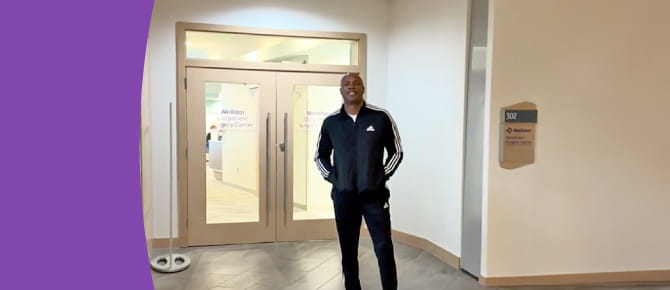
Colorectal Cancer Screening
Wellstar offers colorectal cancer screening to save lives. When physicians find pre-cancerous polyps
during a colonoscopy, it prevents cancer from developing.
Colorectal Cancer Screening Saves Lives
Wellstar offers colorectal cancer screening to save lives. When physicians find pre-cancerous polyps during a colonoscopy, it prevents cancer from developing. If colorectal cancer is identified in Stage I, the survival rate is 91 percent. However, only 11 percent of patients with Stage IV colorectal cancer survive. This underscores the importance of screening to prevent cancer or catch it early to save lives.
People can discuss the best screening options with our physicians, who are trained in preventing colorectal cancer. Our colorectal screening coordinators navigators are here to help you navigate your personalized screening process.
Screening options include:
- A Colonoscopy is a colorectal cancer screening using a flexible, lighted tube to examine and remove polyps from the colon and rectum.
- The FIT Test (Fecal Immunochemical Test) is a screening option that uses antibodies to detect blood in your stool.
- The stool DNA test looks for genetic mutations in the stool specimen.
Who should be screened, and is it covered by insurance?
Even without a single family case, 5 in 100 people will be diagnosed with colon cancer in their lifetime. The best prevention is early detection.
The United States Preventive Services Task Force has recommended that screening for anyone who is at average risk should start earlier at age 45 due to the rising incidence of colon cancer in younger patients.
According to the American Cancer Society,
of all cancer deaths in people under age 50, colorectal cancer is now No. 1 in men and No. 2 in women.
People with a family history or colon cancer related genetic syndromes will need screening to start earlier.
Should I be screened if I don't have symptoms?
Symptoms like blood in your stool, weight loss and stomach pain are signs of more advanced colorectal cancer. Even if you’re feeling no symptoms, a screening can help find a polyp and remove it before it is cancerous to keep you healthy.
Colonoscopies are the gold standard for colon cancer screening. Other screening options are available. Our colorectal screening navigation team can help.












